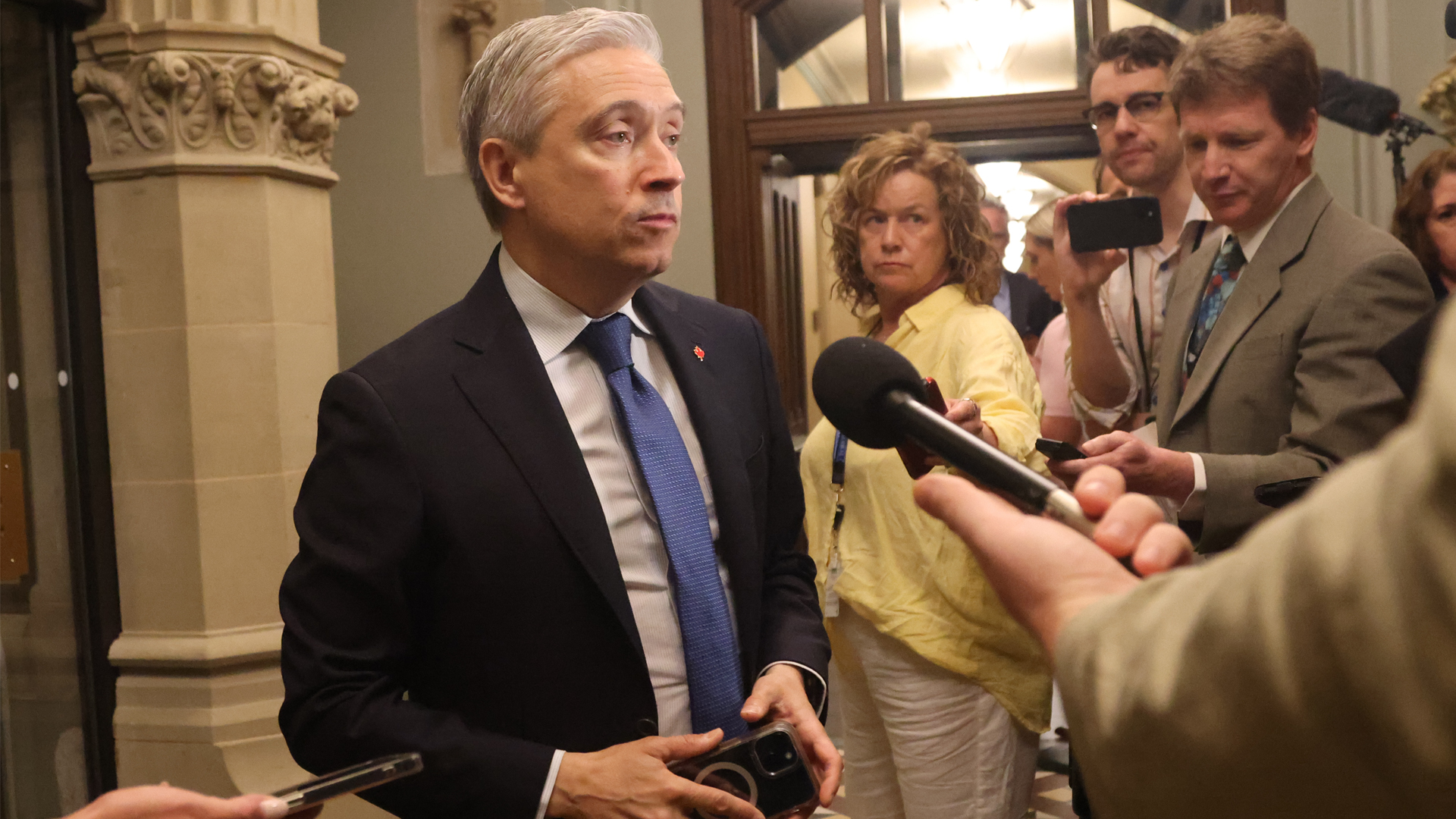
Concentration in the ownership of newspapers is an old story for Canadians. And a sad story because politicians have stood aside indifferently while a necessary underpinning of democracy has been weakened. But what has come lately is worse. Concentration has been joined with convergence in media ownership. By uniting with TV, newspapers have abandoned their previously cher- ished independence from government. Their owners have made themselves financially beholden to politicians.
Some links between newspaper and broadcast owner- ship are of long standing, but now this convergence domi- nates Canada’s media. One large corporation, BCE, controls The Globe and Mail and CTV. The other main net of com- mercial television is in the same Asper ownership as the other national paper and most of the major English-lan- guage papers outside Toronto.
Convergence was a major nostrum in the ideology of the new economy. The fashionable glamour of that ideolo- gy was, briefly, so bewitching that its internal inconsistencies went almost unnoticed. The role of government was supposed to be diminished in favour of the more beneficent giants of private capital. But media convergence in fact enhances the power of government. Freedom of the press is compromised because the fortunes of its proprietors are determined chiefly by the TV licences for which they go, cap in hand, to government.
Subservience to government is journalistic treason. With the warriors of the new economy in retreat or disgrace, convergence of the media can be recognized as an offence that a free and democratic society will not tolerate.
In a market economy, anyone with the money is free to start or buy a newspaper. Broadcasting is different. A licens- ing regime is necessary. To own a TV or radio station, one must apply to government. The authority that issues the licences, the CRTC, has the trappings of a quasi-judicial body, magnificent as a source of legal fees, but subject to direction by Cabinet. Appointments to the CRTC are now highly politicized and its licensing decisions can anyway be changed by Cabinet. A newspaper owned in com- mon with a TV station is a newspaper aware of politicians who may be in office and beholden to those who are””strongly beholden.
That a TV licence is a licence to print money”” as was once famously said by the possessor of one””may now be an overstatement, but certain- ly TV is more important than newspapers in the finances of the new cross-media empires. Their TV licences, not the newspapers they bought by borrowing, are the basis of the Aspers’ wealth. For BCE, The Globe and Mail is financially unimportant beside its stablemate, CTV
The architects of convergence are prone to forecast synergic marvels. In some conspicuous cases, the actual outcome has been retreat and even chaotic collapse. Joining press and TV is, in business terms, small stuff. Journalists, pollsters and a few others can be used for double duty. The benefit may be taken out in profits or””optimists among journalists can hope””it may finance improved services and better pay. Neither effect is large; even if it were, it should be of no account beside the loss of press freedom.
That loss has so far been most strongly dram- atized by the Aspers’ firing of the publisher of their Ottawa paper when it had been strongly critical of the prime minister. The significance of the affair has been confused by the known friendship between Mr. Chrétien and the senior Asper. No doubt his papers would be unleashed to criticize a prime minister so clearly unfriendly as to be a lost cause for their business. Otherwise, any company that combines newspapers and TV has a strong financial incentive not to print any- thing that will make an enemy of any prime min- ister. That is as applicable to a Martin or a Harper as to a Chrétien, to The Globe and Mail as much as to the Ottawa Citizen.
This is quite different from the traditional partisanship of the press. When newspapers were the only mass medium, people commonly had a choice between two of them. And since politics was then chiefly a contest between two parties, competing papers had an incentive to support opposite sides. It was good sport for the commu- nity and made financial sense for the publishers.
That was true partisanship: my party right or wrong, in office or in opposition. In most com- munities the government of the day had both a friend and a foe in the press. However, as direct newspaper competition largely disappeared, the motive for partisanship faded. It was better for a monopoly newspaper not to antagonize either Liberal or Conservative readers. And growing chain ownership reinforced the trend away from definite party associations, in both national and provincial politics.
This is not to suggest that bias in the press necessarily diminished, but it became driven less by party sympathies and more by a general ideological disposition. And the wish to be all things to all readers makes the expression of this neo-conservatism, unlike the old partisanship, generally bland and devious. Only during the brief Black empire in Canada was it direct and ferocious.
The joining of press and TV will be a further and greater qualification to the honesty of jour- nalism. Broadcasting licences have to be renewed; changing technology creates frequent demands for new licences. The effect will not often be as crude as in the Ottawa Citizen affair. Even the Aspers may have to be less imperious in style. The Globe and Mail would in any event be more subtle. Investigative reporting will not be tempered, critical comment muted, so much and so fast as to destroy all semblance of the press’s role as a critic of power. The erosion will be grad- ual. But freedom impaired fudge by fudge is still freedom lost. A press tied to TV licences will not remain a free press.
Some people may argue that this need not be. Licensing could be entrusted to a truly judi- cial body, entirely divorced from politics””which means more divorced than, in practice, our polit- ically appointed courts are. That idea is for dreamland. It is true that some regulatory bodies are more at arm’s length from government than the CRTC now is. They tend to be very deferen- tial to the interests they are supposed to regulate. Broadcast licencing involves issues of democratic public policy for which the final responsibility cannot properly lie with any but elected people. While the procedures of the CRTC could be more refined, no such marginal improvement can replace the ultimate role of Cabinet, of the politi- cians in office.
What is required to restore the press’s free- dom from government is therefore clear- cut. It is separation. It is to prohibit the issue of broadcast licences to owners of newspapers. This can be done immediately, by directive to the CRTC.
Such an Order in Council was in fact made in 1982, prohibiting the common ownership of a newspaper and broadcasting station in the same area. That was the one recommendation of the Royal Commission on Newspapers on which the Trudeau government acted, but it had no effect. Soon afterwards the Liberals were defeated and the Mulroney government quietly revoked the Order.
Twenty years ago the concentration of news- paper ownership, though severe, was not as stultifying as it has since become, and conver- gence with TV was relatively slight. The Royal Commission therefore thought it sufficient to prevent local media monopolies of print and broadcast in the same community. There then seemed little harm in, say, a Kingston newspaper owning a TV station in Brandon.
That view has been made obsolete by two decades of increasing convergence and concen- tration in combination. There are overlaps of Asper TV and print all across the country. Excluding CTV from Toronto would not purge the new controllers of The Globe and Mail from concern to safeguard all their other licences. The independence of the press now requires complete separation of any and all newspapers from any and all broadcasters.
This does not mean confiscation. Existing licences can run their course. Knowledge that they will not be eligible for renewal will be sufficient to break the press’s shackles to government. That is, provided the knowledge is firm. Orders in Council easily made are, as the Mulroney example showed, easy to break. It is essential that this time the direc- tive to the CRTC should be only an interim meas- ure, promptly replaced by parliamentary action. Revoking a previous government’s Order may be done quietly. Repealing an Act of Parliament is another matter. The public criticism to which it would expose both politicians and publishers should be enough to ensure that a press once restored to freedom stays that way.
Free, that is, from government. The other consequences of press concentration will remain. It cramps the breadth of information and nar- rows the diversity of opinion readily accessible for democratic discussion. We can thank the Black and Asper regimes for putting this beyond dispute. When concentration in the English-lan- guage press meant, predominantly, Southam and Thomson, an argument that it made little differ- ence was not quite impossible. The Thomson organization cared little about controlling con- tent as long as it was cheap, and most Southam papers displayed as much journalistic conscience as was common among independent proprietors. In contrast, Black and Asper have been equally uninhibited, if at different levels of crudity, in claiming a right to use their multitude of papers to impose and promote their own opinions.
With this, those who claim that newspaper concentration does no harm to democratic free- dom are left with just one argument: It is that concentration does not matter much because newspapers no longer matter much; people have other sources for all the information and opinion they want. Some, with enough time and resources, do. Most do not. Most people depend on the media for the information on public affairs and the diverse views about those affairs needed by the citizens of a democracy. And among those sources, neither the fleeting images and words of broadcasts, nor the massive bites of undigested information that can be downloaded through computers, are substitutes for daily newsprint. Concentration has narrowed the range and lowered the quality of information that most of the press makes readily available. Everywhere, from St. John’s to Victoria, it has diminished press concern with local affairs. For the country as a whole, it cramps the expression of diverse opinions.
There are two main things to be done about the concentration that is now too imbedded to be greatly undone. One is to find a way to ensure, as the Royal Commission sought to do for its time, that when two or more papers are in common ownership, all but one must operate under a guarantee of editorial independence. The other is to reform the CBC in the sense that, whatever may be its future in other respects, its quality in news and public affairs is fully ade- quate to its democratic role as a countervail to the commercial media.
The difficulty of these reforms makes it all the more necessary not to delay the simple meas- ure that will save the press from the subservience imposed by common ownership with other media. That convergence, unlike concentration, is mostly recent. It is not yet deeply imbedded in journalistic practice or in solid finance. It can be cut out now. In the name of a free democratic society, it must be.







